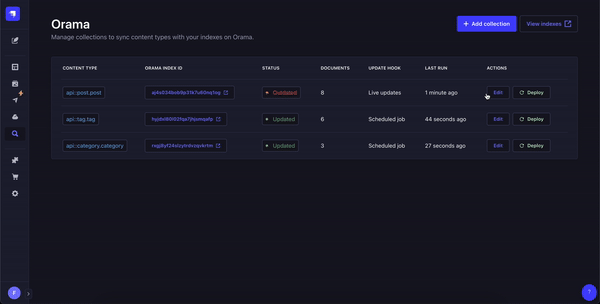This Strapi plugin integrates Orama Cloud's search and answers engine into your Strapi application, providing seamless search capabilities.
npm
npm install @oramacloud/strapi-pluginyarn
yarn add @oramacloud/strapi-pluginpnpm
pnpm add @oramacloud/strapi-plugin- Go to your Strapi administration dashboard.
- Navigate to the
Marketplacesection. - Search for
Orama Cloudand install the plugin.
Configure the plugin in the config/plugins.js file:
// config/plugins.js
module.exports = ({ env }) => ({
"orama-cloud": {
config: {
privateApiKey: env('ORAMA_PRIVATE_API_KEY'),
},
},
});Your ORAMA_PRIVATE_API_KEY will be automatically generated when you create the index. You can also generate a new Private API Key in Developer tools page on Orama Cloud.
Configure and manage Collections that map your Strapi app Content-Types with an Index
on Orama Cloud.
Check out the documentation: Connect to Strapi
- Visit Orama Cloud and Create a new index with data source "Strapi".
- Once your index is ready, copy your Private API Key and configure it in your app's
config/plugins.jsconfiguration file. - Copy the
indexIdand visit your Strapi administration dashboard to configure your first collection.
Collections map your Content-Types on Strapi with an index on Orama Cloud. To keep your index in sync with the data, you can configure the update settings for each collection.
- Select
Orama Cloudfrom your Strapi admin menu to manage your collections. - Add a new collection.
- Paste your newly created
indexId. - Select a Content Type.
- (Optional) Specify the related records to include.
- Configure your document schema and your searchable properties.
- Select the Update Settings option:
- Live updates will update your index as soon as any content is created, updated or deleted.
- Scheduled job will automatically update your index at a defined frequency: every 30 minutes, hourly, daily, weekly or monthly.
When an index is not in sync with the latest changes in Strapi, the collection status is set to outdated.
When the Scheduled job is executed, it checks the collection status, to avoid triggering an update if the data is
already in sync. You can always trigger a new deployment manually.

